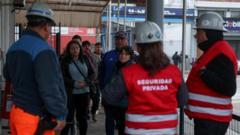As the conflict escalates in Gaza, Hamas faces mounting pressure yet maintains a covert system for disbursing salaries to its civil service. The use of secret meetings and cryptic messages reveals the lengths to which employees go to receive meager compensation while confronting severe economic difficulties and rising public discontent.
The Undercover Cash Flow: How Hamas Navigates Salary Payments Amid Crises

The Undercover Cash Flow: How Hamas Navigates Salary Payments Amid Crises
Despite a war-torn landscape and financial turmoil, Hamas employs a perplexing cash-based system to pay civil servants, stirring anger and resentment.
Hamas's military might has diminished over two years of conflict, yet the group continues to pay the salaries of 30,000 civil servants, totaling around $7 million. Utilizing a clandestine cash-based payment system, employees report receiving about $300 every ten weeks— a fraction of their previous salaries. This has sparked discontent among workers amid soaring inflation. Essential goods, like flour, have reached unprecedented prices, resulting in acute malnutrition among Gaza’s inhabitants.
Due to the destruction of the banking infrastructure, receiving wages has become a perilous affair. Civil servants receive instructions via encrypted messages on their phones, directing them to rendezvous points where cash is discreetly handed over. An unnamed employee from the Hamas Ministry of Religious Affairs expressed the grave risks involved, including encountering Israeli airstrikes at distribution points.
The financial management of Hamas remains unclear post the assassination of Ismail Barhoum, the group's finance chief, by Israeli military forces. Speculation suggests Hamas stockpiled significant cash resources in underground tunnels before the October 7 conflict that escalated the war further. The organization's operations traditionally rely on taxes from Gaza's populace, aid from Qatar, and financial support from Iran, especially for their military wing.
In response to the ongoing war, Hamas has ramped up revenue through taxing traders and extorting exorbitant prices for cigarettes, demonstrating a dismal economic climate and fueling public ire. Many residents criticize the organization's favoritism, alleging that aid allocations benefit Hamas affiliates over the broader population. This sentiment is reinforced by personal accounts of Gaza residents like Nisreen Khaled, who lament watching Hamas supporters receive food aid while they suffer from hunger and deprivation. Reports of Hamas’s appropriation of humanitarian aid add to the community's animosity, as they grapple with escalating hardships amid ongoing conflict.


















